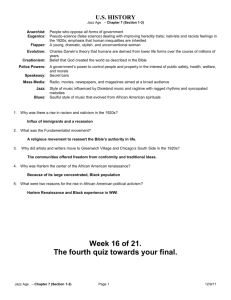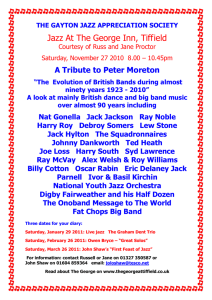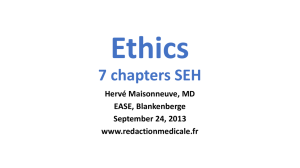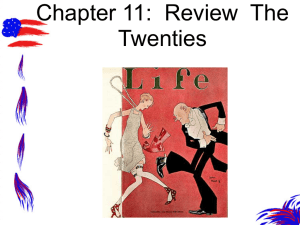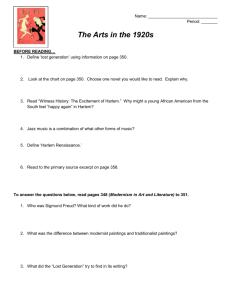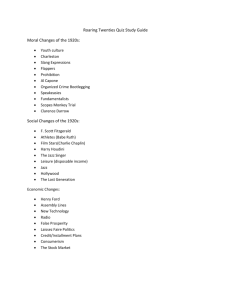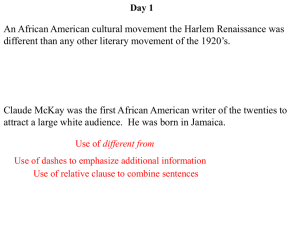Biography
advertisement
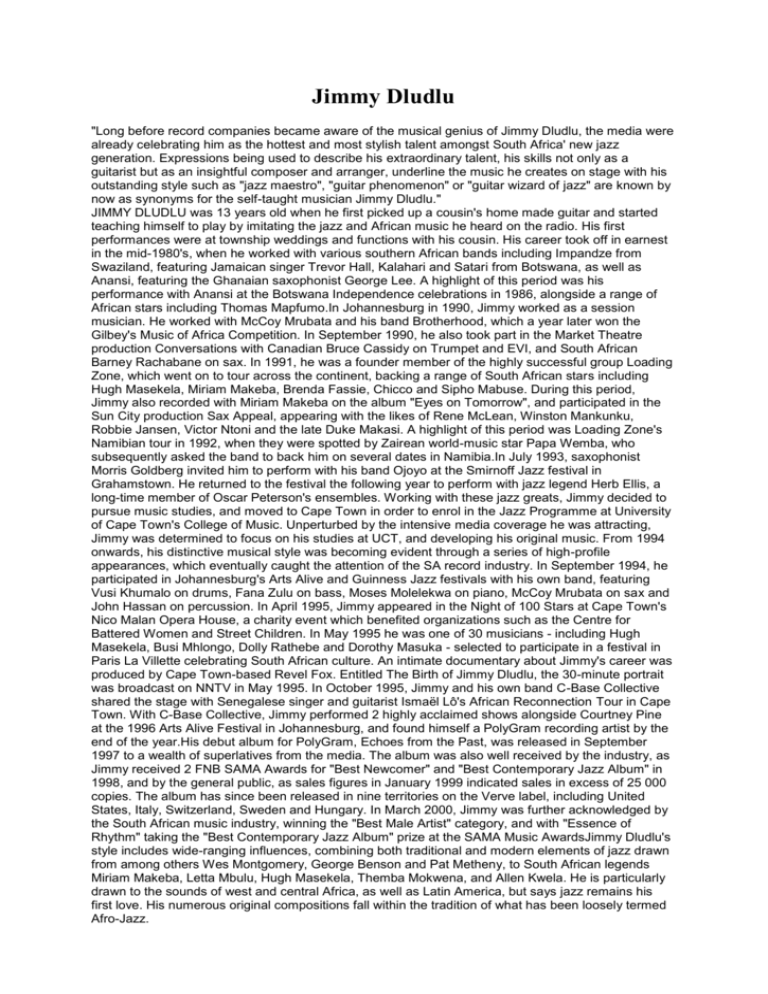
Jimmy Dludlu "Long before record companies became aware of the musical genius of Jimmy Dludlu, the media were already celebrating him as the hottest and most stylish talent amongst South Africa' new jazz generation. Expressions being used to describe his extraordinary talent, his skills not only as a guitarist but as an insightful composer and arranger, underline the music he creates on stage with his outstanding style such as "jazz maestro", "guitar phenomenon" or "guitar wizard of jazz" are known by now as synonyms for the self-taught musician Jimmy Dludlu." JIMMY DLUDLU was 13 years old when he first picked up a cousin's home made guitar and started teaching himself to play by imitating the jazz and African music he heard on the radio. His first performances were at township weddings and functions with his cousin. His career took off in earnest in the mid-1980's, when he worked with various southern African bands including Impandze from Swaziland, featuring Jamaican singer Trevor Hall, Kalahari and Satari from Botswana, as well as Anansi, featuring the Ghanaian saxophonist George Lee. A highlight of this period was his performance with Anansi at the Botswana Independence celebrations in 1986, alongside a range of African stars including Thomas Mapfumo.In Johannesburg in 1990, Jimmy worked as a session musician. He worked with McCoy Mrubata and his band Brotherhood, which a year later won the Gilbey's Music of Africa Competition. In September 1990, he also took part in the Market Theatre production Conversations with Canadian Bruce Cassidy on Trumpet and EVI, and South African Barney Rachabane on sax. In 1991, he was a founder member of the highly successful group Loading Zone, which went on to tour across the continent, backing a range of South African stars including Hugh Masekela, Miriam Makeba, Brenda Fassie, Chicco and Sipho Mabuse. During this period, Jimmy also recorded with Miriam Makeba on the album "Eyes on Tomorrow", and participated in the Sun City production Sax Appeal, appearing with the likes of Rene McLean, Winston Mankunku, Robbie Jansen, Victor Ntoni and the late Duke Makasi. A highlight of this period was Loading Zone's Namibian tour in 1992, when they were spotted by Zairean world-music star Papa Wemba, who subsequently asked the band to back him on several dates in Namibia.In July 1993, saxophonist Morris Goldberg invited him to perform with his band Ojoyo at the Smirnoff Jazz festival in Grahamstown. He returned to the festival the following year to perform with jazz legend Herb Ellis, a long-time member of Oscar Peterson's ensembles. Working with these jazz greats, Jimmy decided to pursue music studies, and moved to Cape Town in order to enrol in the Jazz Programme at University of Cape Town's College of Music. Unperturbed by the intensive media coverage he was attracting, Jimmy was determined to focus on his studies at UCT, and developing his original music. From 1994 onwards, his distinctive musical style was becoming evident through a series of high-profile appearances, which eventually caught the attention of the SA record industry. In September 1994, he participated in Johannesburg's Arts Alive and Guinness Jazz festivals with his own band, featuring Vusi Khumalo on drums, Fana Zulu on bass, Moses Molelekwa on piano, McCoy Mrubata on sax and John Hassan on percussion. In April 1995, Jimmy appeared in the Night of 100 Stars at Cape Town's Nico Malan Opera House, a charity event which benefited organizations such as the Centre for Battered Women and Street Children. In May 1995 he was one of 30 musicians - including Hugh Masekela, Busi Mhlongo, Dolly Rathebe and Dorothy Masuka - selected to participate in a festival in Paris La Villette celebrating South African culture. An intimate documentary about Jimmy's career was produced by Cape Town-based Revel Fox. Entitled The Birth of Jimmy Dludlu, the 30-minute portrait was broadcast on NNTV in May 1995. In October 1995, Jimmy and his own band C-Base Collective shared the stage with Senegalese singer and guitarist Ismaël Lô's African Reconnection Tour in Cape Town. With C-Base Collective, Jimmy performed 2 highly acclaimed shows alongside Courtney Pine at the 1996 Arts Alive Festival in Johannesburg, and found himself a PolyGram recording artist by the end of the year.His debut album for PolyGram, Echoes from the Past, was released in September 1997 to a wealth of superlatives from the media. The album was also well received by the industry, as Jimmy received 2 FNB SAMA Awards for "Best Newcomer" and "Best Contemporary Jazz Album" in 1998, and by the general public, as sales figures in January 1999 indicated sales in excess of 25 000 copies. The album has since been released in nine territories on the Verve label, including United States, Italy, Switzerland, Sweden and Hungary. In March 2000, Jimmy was further acknowledged by the South African music industry, winning the "Best Male Artist" category, and with "Essence of Rhythm" taking the "Best Contemporary Jazz Album" prize at the SAMA Music AwardsJimmy Dludlu's style includes wide-ranging influences, combining both traditional and modern elements of jazz drawn from among others Wes Montgomery, George Benson and Pat Metheny, to South African legends Miriam Makeba, Letta Mbulu, Hugh Masekela, Themba Mokwena, and Allen Kwela. He is particularly drawn to the sounds of west and central Africa, as well as Latin America, but says jazz remains his first love. His numerous original compositions fall within the tradition of what has been loosely termed Afro-Jazz.
